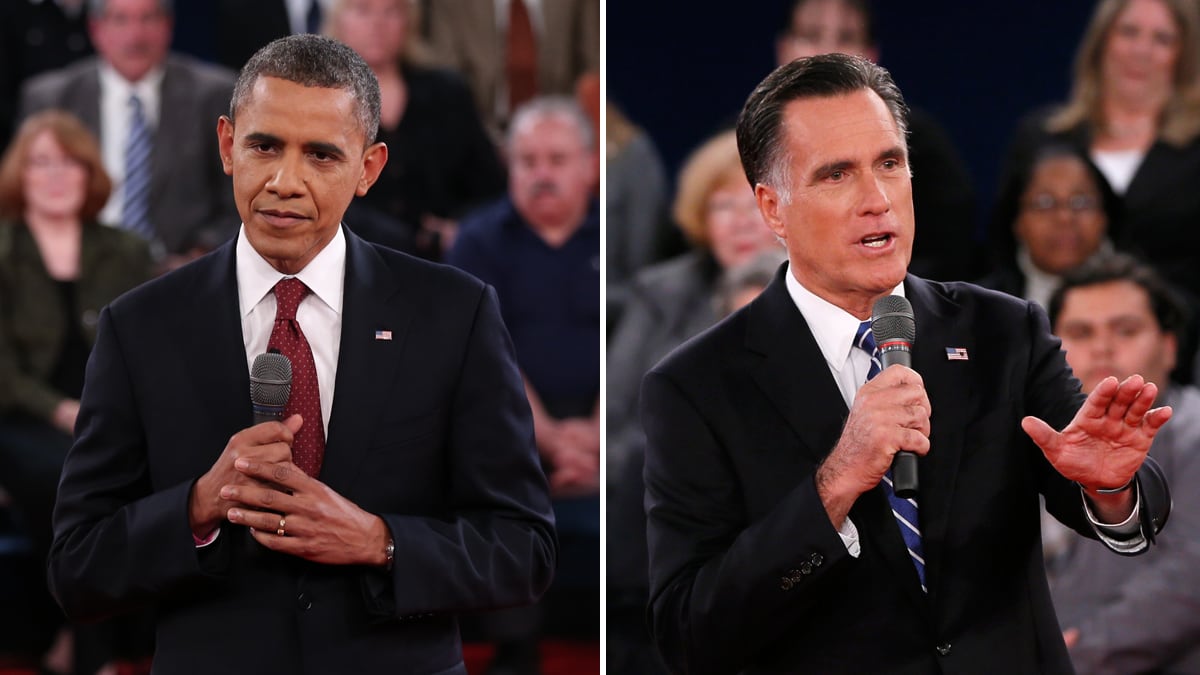Ever since the Aurora massacre in July, gun control advocates have been pleading for Barack Obama and Mitt Romney to address gun violence. In last night’s second presidential debate, Nina Gonzalez, an audience member, finally forced the issue by asking the candidates about guns. Both Obama and Romney said what their supporters wanted to hear, but neither offered up any proposals that would have any significant impact on gun deaths.

Obama, who has the most to lose by focusing on gun control—most elected Democratic officials see gun control as a loser come Election Day—came out in favor of renewing the federal assault weapons ban that expired in 2004. Weapons, he said, “that were designed for soldiers in war theatres don’t belong on our streets.” This was the first time he’s publicly expressed support for the assault weapons ban since assuming office. Party hardliners, who included a call for reenactment of the ban in the 2012 Party Platform, must have been pleased.
An assault weapons ban, however, will not make any serious dent in America’s gun violence. When the ban was in effect prior to 2004, it was largely ineffective. The gun manufacturers easily avoided the ban by making slight, mostly cosmetic changes in their rifles and selling them by the hundreds of thousands.
Although a ban on the sale of large capacity magazines, which was part of the previous ban and a likely provision in any new one, sounds good, mass killers also have an easy way to get around this. Like James Holmes, the Aurora shooter whose assault rifle jammed up during his horrendous attack, they can just carry multiple guns.
In any case, mass shootings aren’t the heart of America’s gun dilemma. Despite all the media attention mass shootings receive, these high-profile and awful incidents count for only a fraction of a percentage of annual gun deaths. As Obama himself noted in the debate, in cities like Chicago “there’s an awful lot of violence and they’re not using AK-47s. They are using cheap hand guns.”
Romney also has reason to want to avoid talking about guns. He knows the National Rifle Association has no choice but to support him. This despite concerns by some gun rights advocates about Romney’s record, which includes signing into law an assault weapons ban when he was governor of Massachusetts. Last night, Romney said he believed no new gun laws were necessary.
“I’m not in favor of new pieces of legislation on guns,” appealing to both gun rights hardliners and swing voters in states like Ohio and Virginia, where gun control isn’t very popular.
The Republican nominee also struck a nerve with his conservative base by putting part of the blame for gun violence on single parent homes. “We need moms and dads helping raise kids,” he said, and suggested that children born out of wedlock were more likely to resort to gun violence. But no governmental program is going to stop people from having children out of wedlock or force couples who want a divorce to stay married.
Besides, plenty of killers come from two-parent homes. The list includes both Jared Loughner, who attempted to kill Rep. Gabrielle Giffords in Tucson, and James Holmes.
Although the candidates differed on their proposals, they were united in one way. They both seemed to share a common misunderstanding about guns. Obama said that part of the solution is to “get automatic weapons that kill folks in amazing numbers out of the hands of criminals and the mentally ill.” He appeared to be referring to the assault weapons the audience member asked about. But assault weapons subject to the ban are not automatic guns. They do not fire more than one round with a single pull of the trigger.
Romney also flubbed this, saying that it is “already illegal in this country to have automatic weapons.” While it is true that the sale of newly manufactured machine guns is against the law, there are hundreds of thousands of older machine guns that are lawfully owned by Americans. Indeed, the first thing a visitor to Las Vegas sees are signs advertising gun ranges where you can shoot machine guns.
Is it any wonder then that the candidates offered little in the way of effective solutions? Neither seems to know much about what they are—finally—talking about.






